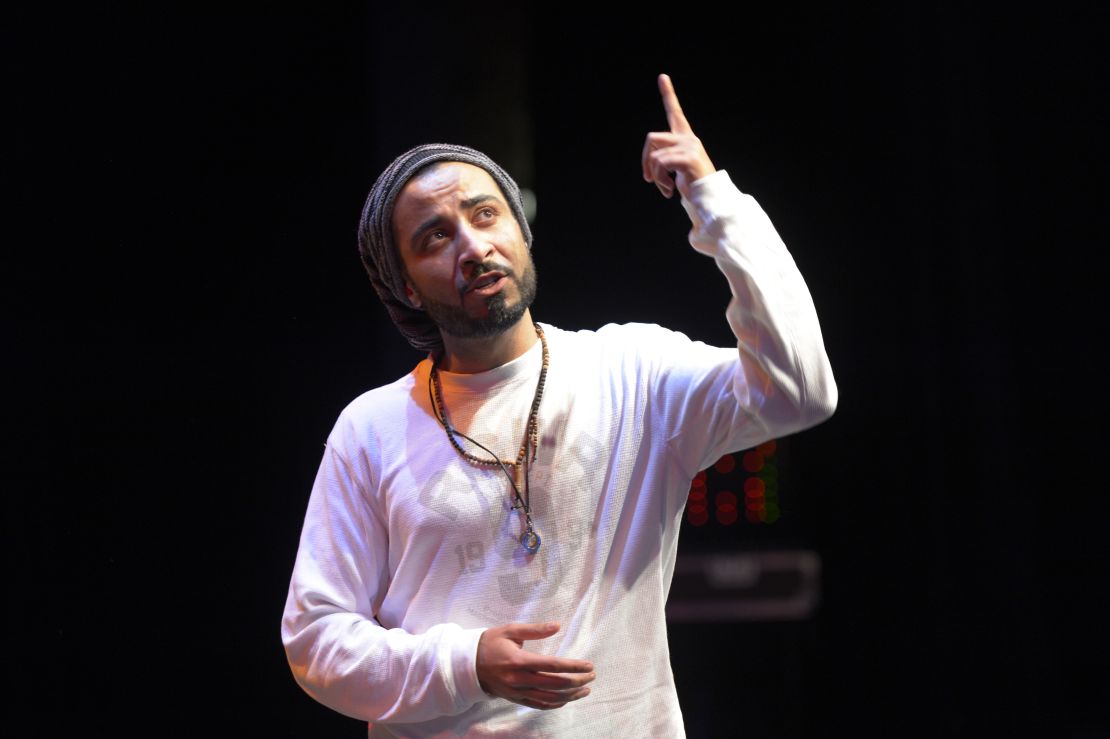Story highlights
Qusai Kheder is a Saudi rapper
He has been rapping for three decades
Saudi Arabia is opening up to new art forms
Qusai Kheder wants to create a musical revolution in Saudi Arabia.
Rapping in Arabic and English, the hip-hop star has already brought a new style to the Kingdom, chalked up millions of views online and he is a regular on popular Saudi TV shows.
Yet breaking through as a rapper in a kingdom where many forms of entertainment, including cinemas, are banned, has taken patience, perseverance and lots of hard work.
“As a kid from Saudi Arabia, if this is what you’re planning to pursue … your chances are slim to none of making it,” he tells CNN.
“That culture and that art (hip-hop) does not exist here,” he says. “You are going to have to build it yourself.”
Start from the bottom
Qusai – also known as Don Legend the Kamelion – started rapping three decades ago at a time when musical performances in Saudi Arabia were extremely rare.
The 39-year-old says his first tracks were recorded on cassette and sold via the back of a truck near his high school.
“People always used to look at me and be like: ‘Oh wow. You’re doing rap and hip-hop like Tupac, Dr Dre, Snoop Dogg and Wu Tang,’” he recalls.
“I felt like I was introducing something totally new to the culture.”
Despite being influenced by American rap artists including NWA and Tupac Shakur – and spending time studying in the US – Quasi has always embraced topics and themes closer to home in his work.
His songs blend hip-hop with traditional Saudi folk melodies and explore everything from unemployment to marriage. And they are family friendly – his lyrics don’t contain profanities.
“When I express myself, I have to respect my heritage, my culture, my ethnicity,” he says. “Once people hear what I say, they might get influenced by it.”
While some have responded enthusiastically to Qusai’s music, others have mocked him for looking to foreign influences.
“(Those people would say) what are you doing? What you’re presenting is a joke. You’re imitating … American culture,” Qusai says, before refuting such suggestions. “No, I’m not. I fell in love with hip-hop. I fell in love with this art. And this art is internationally known.”

Other rap enthusiasts have faced similar pushback.
Hassan Ahmed started one of Saudi Arabia’s first hip-hop radio shows in 2011. He tells CNN that within moments of his debut show hitting the airwaves negative messages started arriving in his inbox.
“So, I’m saying the greetings of Islam: ‘Assalamualaikum, welcome to Laish Hip-Hop in Arabic,’” Ahmed recalls. “Five minutes later, I get a message saying I’m an infidel.”
Changing times
Over time, Qusai acquired fans and became a household name. The YouTube video for his song “Yalla” has received 10 million views.
During this period, Saudi Arabia also began to change. Earlier this year, the country’s rulers started encouraging various forms of public entertainment, such as concerts. Women will soon be given the right to drive.
The country’s crown prince, Mohammed bin Salman, has spoken of destroying “extremist ideologies” in the country and pursuing a more “moderate” form of Islam.
Qusai believes that allowing young Saudis to pursue their interests and talents is crucial.
Just below 50% are under the age of 30, according to the Saudi General Authority for Statistics, although the crown Prince put that figure even higher at 70% last month.
“We have so much talent in this upcoming generation,” Qusai says. “We need to supply the outlets for them … there’s nothing wrong with a little bit of art.”
In the spotlight
Having just released his fifth album, Qusai recently performed to a crowd of men and women in his home city of Jeddah.
The concert marked the first time Qusai had played at home since it was announced earlier this year that hip-hop would be included in programs by the influential Saudi Arabian Society for Culture and Arts (SASCA), which sponsors and develops Saudi artists.
That the crowd contained both sexes also reflects the changing nature of life within the country. Having an artist like Qusai front and center, rapping in English and Arabic, paints a favorable picture of a country looking to reinvent itself to international audiences.
It also fits with the narrative of bin Salman’s Vision 2030 strategy to make Saudi Arabia more open and moderate.
Qusai says he always believed it was only a matter of time before Saudis warmed to his music and the hip-hop genre.
“I knew if you deliver something right, clean, with respect to our culture, sooner or later someone is going to pay attention,” Qusai says.


